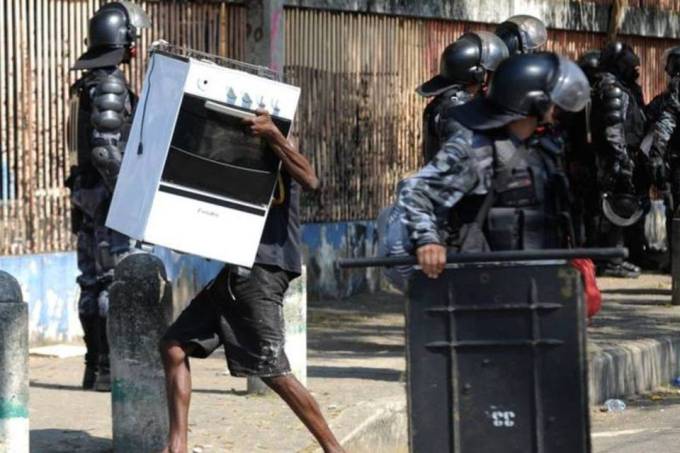RIO DE JANEIRO, BRAZIL – Over 6,000 Brazilian families were evicted from their homes during the novel coronavirus pandemic. The mapping of data on evictions and displacements in the country was conducted by more than 40 organizations that form the Campanha Despejo Zero (Zero Eviction Campaign), launched in July this year, which calls for the suspension of such procedures during the pandemic. The survey was conducted between March 1st and August 31st.

“Governments – city halls, states and the judicial system – should not be, at this pandemic moment, displacing families from their homes, no matter where they live, because the worldwide guideline is for families to remain at home. Because this implies increasing the vulnerability of families who should have been covered by public housing policies and were not,” said Margareth Uemura, coordinator of the Pólis Institute’s urban planning team. Pólis is one of the organizations involved in the campaign.
More than 30 eviction cases were identified during the analyzed period, affecting 6,373 families. According to Margareth, public authorities are partly responsible for the situation, since they should have a housing policy with appropriate consideration to the most vulnerable population.
The survey was conducted based on data collected by the institutions that make up the campaign, between March 1st and August 31st, through denunciations, online forms, and information from the Observatório das Remoções (Removals Observatory) and public defenders office’s database.
“The campaign was created precisely because the federal government, the Presidency of the Republic, failed to take any measures to prevent this from occurring. Federal deputies drafted a bill [PL 1.975/20], which is sitting in the Chamber of Deputies requesting that these displacements, these evictions, not be carried out during the pandemic,” Margareth said. The bill has not yet been voted on.
Amazonas accounted for 47 percent of the cases, with 3,000 evictions. São Paulo also saw a significant number of families displaced from their homes: 1,681 evictions, equivalent to 26 percent of all cases. Displacement were also reported in Minas Gerais, Pernambuco, Sergipe and Roraima, Paraná, Santa Catarina, Maranhão and Rio Grande do Norte, Goiás, Rio de Janeiro and Rio Grande do Sul.
The mapping showed that the main justification for the evictions were repossessions, conflicts with owners and impact due to public works. The displacement of families occurred despite the guidelines of the Human Rights Commission of the United Nations (UN). In July this year, the UN Special Rapporteur on Housing, Balakrishnan Rajagopal, issued a manifesto urging the country to halt evictions and removals while the Covid-19 pandemic persists.
“We have the WHO [World Health Organization] saying that the best measure is to protect families and keep them at home. And we have the guidance of the UN, both the rapporteur Balakrishnan Rajagopal and the High Commissioner for Human Rights, not to allow these displacements either. Evictions are to be stopped during the pandemic period,” Margareth emphasized.
On September 4th, during an online event organized by the Pólis Institute, the Plataforma Global pelo Direito à Cidade (Global Platform for the Right to the City) and the Plataforma Brasileira de Direitos Humanos (Brazilian Platform for Human Rights – DHESCA), social movement and civil society organizations representatives submitted the survey to Rajagopal and denounced Brazil for evictions, displacements and violation of rights.
Threats
The campaign recorded 85 eviction threats over the same period, said to affect 18,840 families. The majority of cases were identified in São Paulo, where eviction lawsuits could affect 4,853 families, 25.75 percent of the total. Next came the states of Rio Grande do Sul (3,340), Pernambuco (2,393), Piauí (2,000), Bahia (1,808), Rio de Janeiro (1,626) and Minas Gerais (1,000).
Margareth said that the campaign succeeded in reversing ten cases of eviction threats. “Many of these cases were suspended due to popular and campaign pressure. As for the threatened families, we have been working with the courts and governments to reverse them [evictions].”
The Other Side
The Ministry of Women, Family and Human Rights (MMFDH) reported that it received, through the Ministry of Foreign Relations (MRE), a copy of the UN letter signed by the special rapporteur, requesting explanations on eviction cases in the state of São Paulo, in the context of the Covid-19 pandemic. “On August 28th, 2020, the MMFDH provided a report to the MRE, according to input from federal government bodies, the government of the state of São Paulo, and the Judiciary,” says the MMFDH.
The Human Rights Department confirmed that it received another document, also signed by the special rapporteur, on the right to suitable housing, requesting information on the displacement of families of members of the Landless Rural Workers Movement (MST) from the Quilombo Campo Grande settlement in the state of Minas Gerais. According to the Ministry, the state has until October 19th “to submit a statement, which is in its preparation stage.”
In the text, the Ministry adds that it has developed initiatives to protect and ensure rights. “We are working on the development of the Moradia Primeiro (Housing First) program, which consists of a proposal for housing, employment, social assistance and health policies,” says the portfolio. According to the Ministry, the Moradia Primeiro program is intended to serve the homeless population.
Source: Exame

